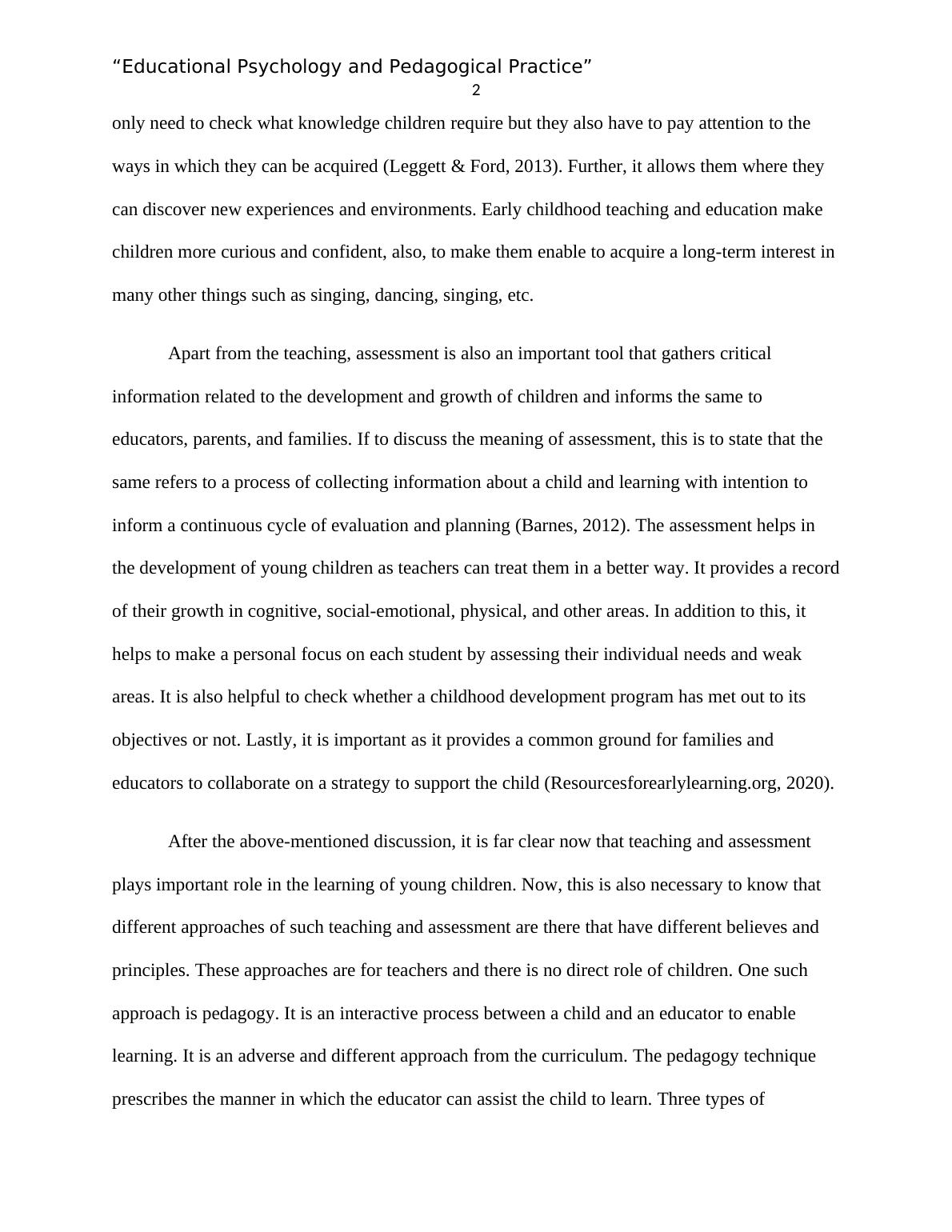Educational Psychology and Pedagogical Practice
Added on 2022-08-10
8 Pages2075 Words152 Views
Educational
Psychology and
Pedagogical
Practice
Running Head: 0
2 / 2 5 / 2 0 2 0
Student’s Name
Psychology and
Pedagogical
Practice
Running Head: 0
2 / 2 5 / 2 0 2 0
Student’s Name

“Educational Psychology and Pedagogical Practice”
1
Children who start getting an education in the early years are likely to have improved
brain, social and emotional development. Teachers play an important role in the learning and
development of a child that will be discussed in this report. The objective of the report is to
check the significance and role of assessment and teaching in the development and learning of
young children. In the student’ teacher understanding of learning, different concepts of learning
can be found such as cognitive-constructivist, behaviorist and socio-constructivist (Krull, Koni
& Oras, 2013). Different approaches to teaching such as contemporary teaching and assessment
approaches and pedagogical approaches will also be discussed. In addition to this, the
importance of the ethical role of the teacher in assessing and teaching young children will remain
in focus.
Starting the discussion over subjective topic this is to state that teachers pay their
attention to the overall development of children including social, physical, cognitive and
emotional development. They plan and develop activities and lessons according to the interest of
the child and ask them different questions to develop further understanding. By teaching a child
to learn to find a solution for the issues and new vocabulary that makes their mental
development. Teachers collect data relate to child learning that can further be used to inform
parents (ccpre.org, 2020). Children are impressionable and learn from their surroundings. It is
well known that the learning process is instrumental in shaping a child's personality and teaching
works as a medium of knowledge that children are exposed to. It promotes the competence
development of children. The early years of a child are the foundation of his/her future
development that provides a base for lifelong learning abilities. Teaching provides many
advantages to young children that further contribute to their development. Firstly, it improves
their social skills where they get to engage with other children in a better way. Teachers do not
1
Children who start getting an education in the early years are likely to have improved
brain, social and emotional development. Teachers play an important role in the learning and
development of a child that will be discussed in this report. The objective of the report is to
check the significance and role of assessment and teaching in the development and learning of
young children. In the student’ teacher understanding of learning, different concepts of learning
can be found such as cognitive-constructivist, behaviorist and socio-constructivist (Krull, Koni
& Oras, 2013). Different approaches to teaching such as contemporary teaching and assessment
approaches and pedagogical approaches will also be discussed. In addition to this, the
importance of the ethical role of the teacher in assessing and teaching young children will remain
in focus.
Starting the discussion over subjective topic this is to state that teachers pay their
attention to the overall development of children including social, physical, cognitive and
emotional development. They plan and develop activities and lessons according to the interest of
the child and ask them different questions to develop further understanding. By teaching a child
to learn to find a solution for the issues and new vocabulary that makes their mental
development. Teachers collect data relate to child learning that can further be used to inform
parents (ccpre.org, 2020). Children are impressionable and learn from their surroundings. It is
well known that the learning process is instrumental in shaping a child's personality and teaching
works as a medium of knowledge that children are exposed to. It promotes the competence
development of children. The early years of a child are the foundation of his/her future
development that provides a base for lifelong learning abilities. Teaching provides many
advantages to young children that further contribute to their development. Firstly, it improves
their social skills where they get to engage with other children in a better way. Teachers do not

“Educational Psychology and Pedagogical Practice”
2
only need to check what knowledge children require but they also have to pay attention to the
ways in which they can be acquired (Leggett & Ford, 2013). Further, it allows them where they
can discover new experiences and environments. Early childhood teaching and education make
children more curious and confident, also, to make them enable to acquire a long-term interest in
many other things such as singing, dancing, singing, etc.
Apart from the teaching, assessment is also an important tool that gathers critical
information related to the development and growth of children and informs the same to
educators, parents, and families. If to discuss the meaning of assessment, this is to state that the
same refers to a process of collecting information about a child and learning with intention to
inform a continuous cycle of evaluation and planning (Barnes, 2012). The assessment helps in
the development of young children as teachers can treat them in a better way. It provides a record
of their growth in cognitive, social-emotional, physical, and other areas. In addition to this, it
helps to make a personal focus on each student by assessing their individual needs and weak
areas. It is also helpful to check whether a childhood development program has met out to its
objectives or not. Lastly, it is important as it provides a common ground for families and
educators to collaborate on a strategy to support the child (Resourcesforearlylearning.org, 2020).
After the above-mentioned discussion, it is far clear now that teaching and assessment
plays important role in the learning of young children. Now, this is also necessary to know that
different approaches of such teaching and assessment are there that have different believes and
principles. These approaches are for teachers and there is no direct role of children. One such
approach is pedagogy. It is an interactive process between a child and an educator to enable
learning. It is an adverse and different approach from the curriculum. The pedagogy technique
prescribes the manner in which the educator can assist the child to learn. Three types of
2
only need to check what knowledge children require but they also have to pay attention to the
ways in which they can be acquired (Leggett & Ford, 2013). Further, it allows them where they
can discover new experiences and environments. Early childhood teaching and education make
children more curious and confident, also, to make them enable to acquire a long-term interest in
many other things such as singing, dancing, singing, etc.
Apart from the teaching, assessment is also an important tool that gathers critical
information related to the development and growth of children and informs the same to
educators, parents, and families. If to discuss the meaning of assessment, this is to state that the
same refers to a process of collecting information about a child and learning with intention to
inform a continuous cycle of evaluation and planning (Barnes, 2012). The assessment helps in
the development of young children as teachers can treat them in a better way. It provides a record
of their growth in cognitive, social-emotional, physical, and other areas. In addition to this, it
helps to make a personal focus on each student by assessing their individual needs and weak
areas. It is also helpful to check whether a childhood development program has met out to its
objectives or not. Lastly, it is important as it provides a common ground for families and
educators to collaborate on a strategy to support the child (Resourcesforearlylearning.org, 2020).
After the above-mentioned discussion, it is far clear now that teaching and assessment
plays important role in the learning of young children. Now, this is also necessary to know that
different approaches of such teaching and assessment are there that have different believes and
principles. These approaches are for teachers and there is no direct role of children. One such
approach is pedagogy. It is an interactive process between a child and an educator to enable
learning. It is an adverse and different approach from the curriculum. The pedagogy technique
prescribes the manner in which the educator can assist the child to learn. Three types of

End of preview
Want to access all the pages? Upload your documents or become a member.
Related Documents
ROLE OF TEACHING ASSESSMENT 2022lg...
|10
|2210
|27
Program Statement Reviewlg...
|6
|971
|12
Educational Psychology and Pedagogical Practice in Early Childhood Education and Carelg...
|8
|2207
|127
Music Arts in Childhoodlg...
|5
|1145
|87
Importance of Teaching and Assessment in the Learning and Development of Young Childrenlg...
|10
|2510
|283
Early Childhood Education and Carelg...
|7
|1054
|304
